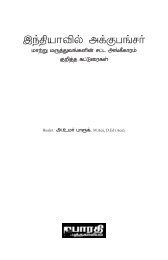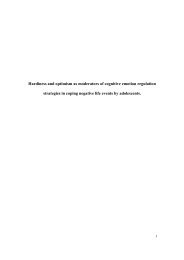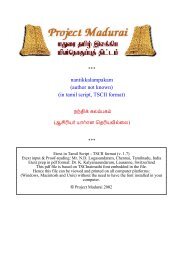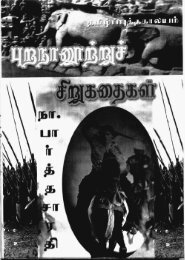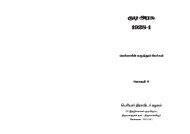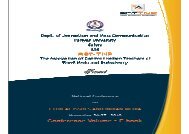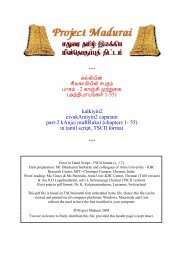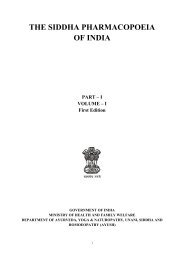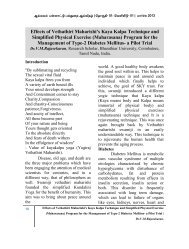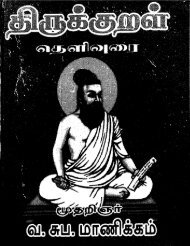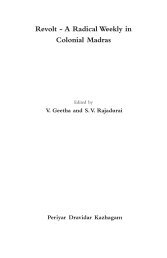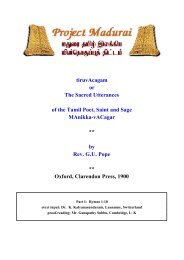THE FUNDAMENTAL RULES OF THE TAMIL NADU GOVERNMENT
THE FUNDAMENTAL RULES OF THE TAMIL NADU GOVERNMENT
THE FUNDAMENTAL RULES OF THE TAMIL NADU GOVERNMENT
- No tags were found...
You also want an ePaper? Increase the reach of your titles
YUMPU automatically turns print PDFs into web optimized ePapers that Google loves.
(2) In the case of Government servants who are not deputed out of India for special items of workbut are placed on continuous service with Commissions and Committees whose functions requirework both in and out of India, the expression should be interpreted as having reference to the paywhich they would have drawn in India had they continued on duty with the Commission or Committeethere.[G.I.F.D., Endorsement No. F-4(II) R-I/30, dated 27th July 1931.]Note.—The Accounts Officer should intimate to the High Commissioner in each case after consultationwith Government, the pay which an officer would have drawn, if on duty in India.(G.I.F.D., letters to the India Office No. F-47 R-1, dated 29th May 1928.)(3) The position regarding the grant of travelling allowance passage to officers, who are sent ondeputation abroad and who take leave—either in India or abroad—immediately before, during orimmediately after a period of deputation (including deputation-cum-special leave) has beenconsidered and, in supersession of the earlier orders in this regard, is decided as follows:—A. Leave availed of in India.—(i) Leave of any kind taken in India, whether immediately before thecommencement of the period of deputation or immediately on return to India at the end of suchdeputation will have no effect on the deputed officer’s title to passage and normal transit time pay inrespect of the portions of journeys undertaken during the period of deputation as admissible to him.In such cases, if the leave is taken immediately before the commencement of the deputation, theperiod of deputation, subject to the provisions of sub-paragraph (ii) below, will be deemed tocommence from the date on which the officer embarks on his journey from the last sea/air port, inIndia. Similarly, if the leave is taken immediately at the end of deputation, the period of deputation,subject to the provisions of sub-paragraph (ii) below, will be deemed to end on the date on which theofficer disembarks at the first sea/air port on arrival in India.(ii) If the leave taken in India in conjunction with the period of deputation is of the nature ofearned leave for a period not exceeding 120 days, the normal time taken by the officer on his journeyfrom the place where he was sending his leave to the sea/air port of embarkation, limited to thenormal time taken on the journey from his headquarters in India to the port of embarkation or thenormal time taken on the journey from the port of his disembarkation to his headquarters, may underthe orders of the authority competent to sanction the deputation be treated as transit time andincluded in the period of his deputation. In cases of leave not exceeding 120 days, irrespective of thenature of leave, he may also be granted traveling allowance for his journeys in India if such journeysreally arise out of and are incidental to his deputation abroad, travelling allowance being allowed fromthe place where the officer was spending his leave to the port of embarkation or from his normalheadquarters to the port of embarkation, whichever is less, in the case of outward journeys and fromthe port of disembarkation in India to the normal headquarters in the case of return journeys.N.B.—The provisions of sub-pargaraph (ii) above will not be applicable in the cases of leave exceeding120 days.B. Leave availed of outside India.—(i) In case leave is taken abroad before, during or at the end ofthe period as deputation on medical grounds or in order to spend profitably of period of enforced haltdue to unavoidable waiting for a passage, such leave will have no adverse effect on the officer’s titleto normal transit time, pay and passage. The period of leave itself should, of course, not be treatedas part of the period of deputation and no daily allowance, travelling allowance or other concessionswill be admissible during such leave.(ii) An officer, who has proceeded abroad on deputation, may in the exigencies of public servicepermitting, be granted a short spell of leave abroad for personal reasons at the commencement,during or at the end of his assignment abroad without affecting his title to the normal transit time payand passage to and fro as admissible under the rules. Such leave should not, however, exceed 50per cent of the actual period of duty performed/to be performed outside India (excluding the transittime from India to the country of deputation and back and enforced halts, if any) or a fortnight,whichever is less. The Officer will not be granted any daily allowance or travelling allowance or anyother concession during such period of leave.(G.O. Ms. No. 820, Finance, dated 27th June 1961.)(4) The period spent in Delhi for pre-departure formalities (e.g.,) medical examination,passport, travel arrangements, etc., upto a maximum of four days may be treated as transit93



